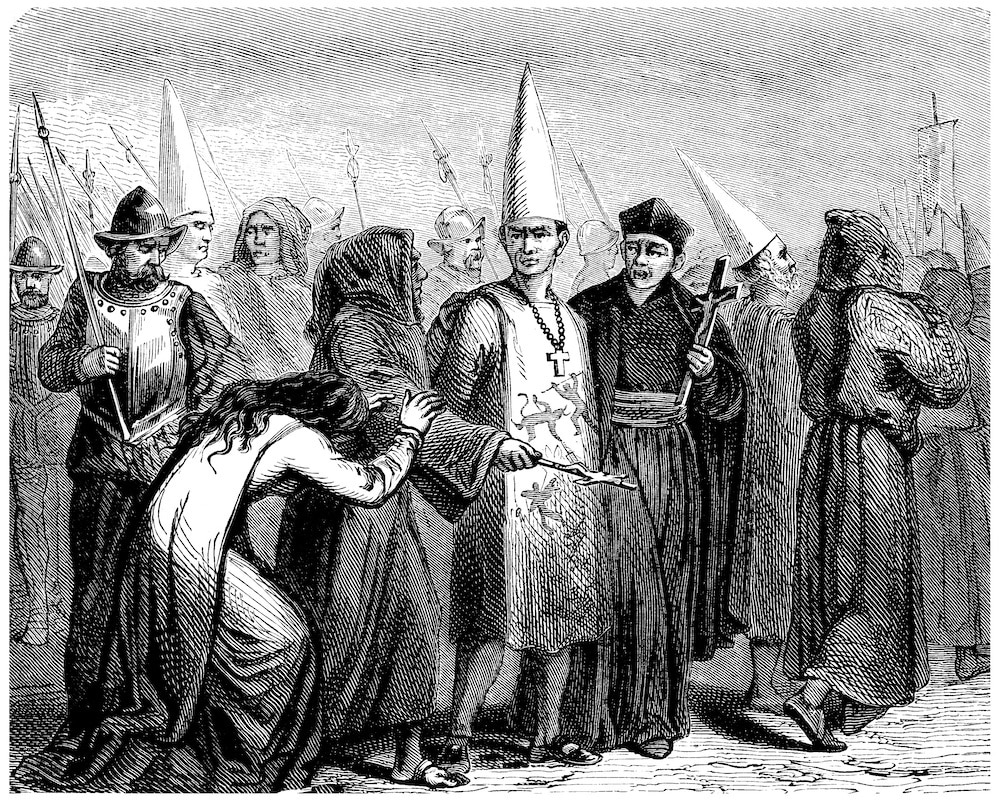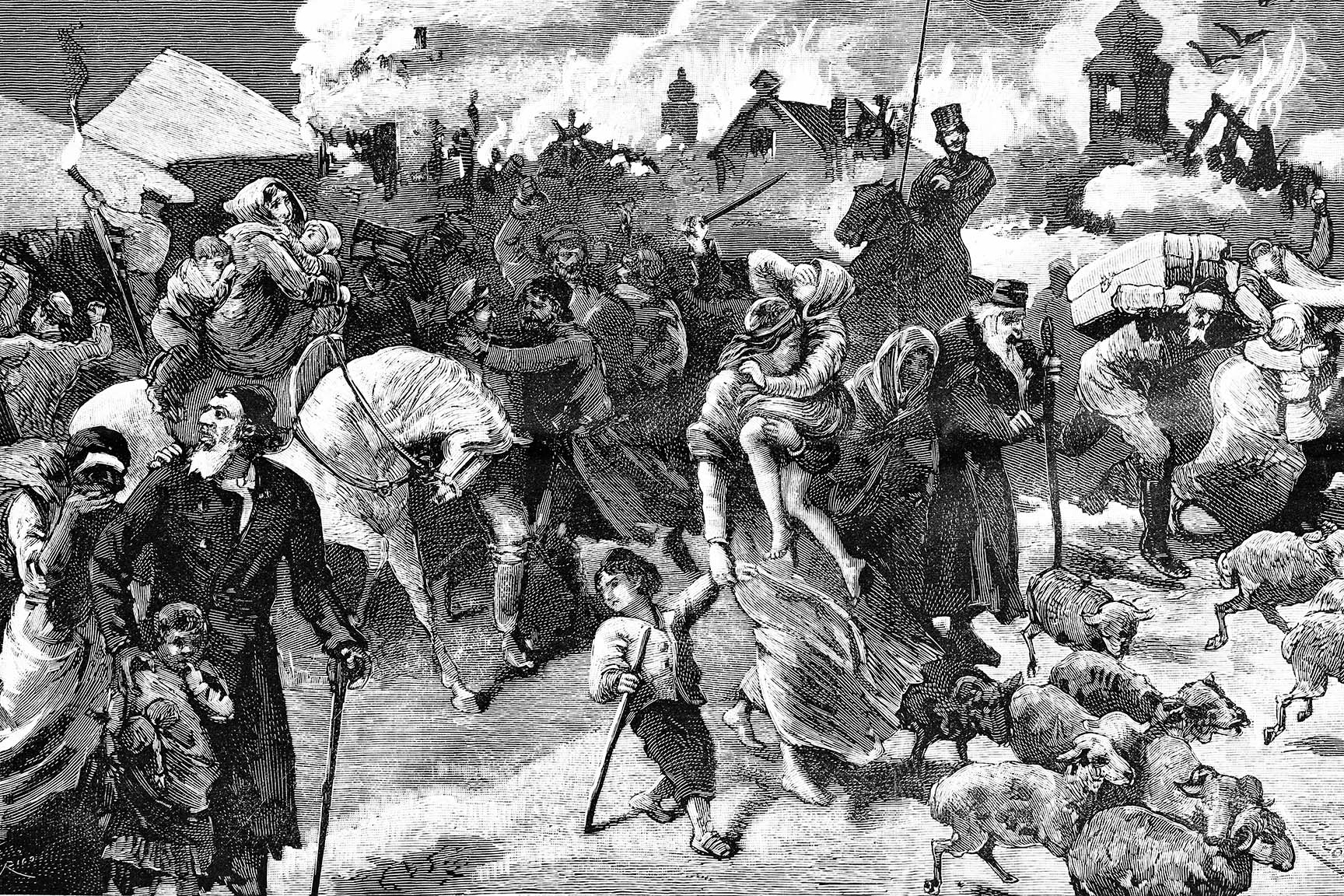Worldwide antisemitism is exploding in a way not seen since the Third Reich. Triggered by the events of October 7 in Israel, expressed hatred toward Jewish people has manifested in the form of rallies in major cities, threats and assaults on college campuses, and all manner of horrific hate speech across social media platforms. Yet, as much as one might want to call this phenomenon new, it has a history spanning millennia—a long and destructive history with roots in humanity’s rebellion against God and His purposes.
Hatred of Jewish People in Biblical Times
From a biblical perspective, the Jewish story begins with Abraham, more than 2,000 years before the time of Jesus. God appeared to Abraham and promised to make him a great nation, one who would bless the world (Genesis 12:3). Since then, Jewish people have played a central role in God’s plan for world redemption—and the devil has opposed this nation. In the Old Testament, Israel faced grave threats and persecution, but God always came through. Time and again, other nations responded to Israelite success with fear and violence.
As the children of Israel prospered and grew in Egypt, the Pharoah feared they would align with the enemies of Egypt and fight against them and determined to oppress God’s people (Exodus 1:8–11). As if subjecting the Israelites to slavery was not enough, the Egyptians took the genocidal step of slaughtering Hebrew male infants (Exod 1:22). However, at the right time, God rescued His people with numerous signs, including the plagues, which demonstrated His power and judged Egypt for mistreating Israel. From then on, the Bible tells the story of how the Lord made a group of liberated slaves into a great people who would bless all the earth—Israel.
Not long after the Israelites left Egypt, Balak, the king of Moab, hired Balaam to curse Israel (Numbers 22:4–6). But God intervened, turning the curse into a blessing (Num 23–24). When Haman plotted the destruction of all Jewish people, God turned his plans back on his head (Esther 7–8). Whatever the threat, the Lord preserved His people, promising Israel would never cease to be a nation before Him (Jeremiah 31:35–37). There are many other examples of attempted genocide of Jewish people. Humans, in their sin-sickness, have turned against God and rejected His rule over the world; the hatred of God’s chosen people is one symptom of this deadly disease.
Hatred of Jewish People in Ancient Times
Israel experienced several periods of hatred and exile when they were forcibly taken from the land God had promised them. Assyria conquered the northern kingdom in 722 BCE, and Babylon defeated the southern kingdom and exported them in 604 and 586 BCE. Babylon fell to Persia in 540 BCE, bringing Israel under the rule of Cyrus the Great. Following the exile, many Jewish people returned to the land. In the third century BCE, Israel came under the control of the Syrian Greeks. One of their leaders, Antiochus IV Epiphanes, tried to force Jewish people to worship the pagan Greek gods. In 167 BCE, Mattathias and his family, known as the Maccabees, led a revolt. Jewish forces, though greatly outnumbered, defeated the Syrian Greeks. This victory is the basis for the holiday of Hanukkah.
Not long after, with the coming of the Roman Empire, the land of Israel became a Roman province. The new empire’s attitudes toward Jewish people were mixed. Some Romans, including upper-class citizens, took an interest in Judaism and even converted. Some of these Gentiles who sought the God of Israel are the “God-fearers” to whom the New Testament refers (Acts 10:2, 13:16, etc.).[1]
Other Romans, however, looked upon Jewish people with suspicion, claiming they despised non-Jewish people. For instance, the Roman historian Tacitus (56–120 CE) wrote how Jewish traditions reflect disdain toward the rest of humanity, to whom “they feel only hate and enmity.”[2] This sentiment is eerily similar to Hellenism, which is “the spread of traditional Greek linguistic, political, social, cultural, historical, and religious beliefs and practices throughout the ancient Near East.”[3] Rejection of foreign culture often led to problems for Jewish people, as seen in their rejection of the Greek culture under Antiochus IV and Roman culture under Tacitus.
Though Jesus and His earliest followers were Jewish, the church became increasingly Gentile as the gospel spread across the Mediterranean. Many Gentile Christians grew prideful, believing God rejected Israel because, as a whole, the nation did not recognize Jesus as the Messiah. Church leaders claimed Christians replaced or superseded ethnic Israel in God’s purposes. Replacement theology has been the most dominant view of Israel in church history. This thinking fostered negative attitudes toward Jewish people, which contributed to persecution through the centuries and continues to shape Christian theology to this day.[4]

Burning of heretics during the Spanish Inquisition
Hatred of Jewish People in the Middle Ages
In the early and high Middle Ages, Christianized Europe’s treatment of the Jewish community was generally conditional toleration. Christian leaders looked down on Jewish people, believing God rejected Israel and holding all Jewish people perpetually guilty of the death of Jesus. Persecution of Jewish people intensified in and following the twelfth century. This period saw the Crusades, the rise of the blood libel, the Spanish Inquisition, and numerous expulsions.
Crusading forces often massacred Jewish towns in Europe on their way to the Holy Land and murdered Jewish people living in Israel at the time. The blood libel is the false accusation Jewish people kidnap Christian children to use their blood in Passover matzah (unleavened bread). This charge first arose in England in 1144 but resurfaced often in the following centuries. Forms of it still exist today.[5] During the Spanish Inquisition, Catholic leaders targeted Jewish people who purportedly converted to Christianity but secretly practiced Judaism. In 1492, Spain expelled all Jewish people who did not convert. This expulsion was one of the largest, but several others occurred in England and parts of Germany and France.

Expulsion of Jewish people from a Russian village, 1882.
Hatred of Jewish People in the Modern World
Several Protestant Reformers voiced hatred toward Jewish people. Of these, the most infamous statements came from Martin Luther. In his pamphlet, “Concerning the Jews and Their Lies,” he recommended, “their synagogues . . . should be set on fire. . . . Their homes should likewise be broken down and destroyed . . .”[6] Around this time, the system of ghettos developed in many European cities, in which Jewish people were isolated from the rest of society. Ghettos often had a curfew, at which time the city locked Jewish people within its walls for the night. These prison-like conditions were the norm for Western Europe’s Jewish community until at least the French Revolution.

Cattle cars used to transport Jewish people to Nazi death camps
Violence against Jewish communities was generally more common and deadly in Eastern Europe. A series of pogroms in the late 1800s and early 1900s across Russia shocked the world. The modern age saw the dawn of “race-based” hatred of Jewish people. Racist theories about the supposed inferiority of Jewish people proved pivotal to Nazi ideology. Under the leadership of Adolf Hitler, the Nazis determined the “Final Solution” to “the Jewish question” was extermination. As the Nazi regime conquered much of Europe during World War II, they systematically shipped Jewish people to death camps. Through this diabolical system, the Nazis murdered more than six million Jewish people and millions of others they deemed unworthy of life.
Conclusion
Those who perpetrated the heinous attacks on October 7, now known as Black Saturday, are only the latest in a long line of those who failed to rid the world of Israel and Jewish people. However, God’s promise to preserve His people will never relieve us of our responsibility to act in the face of unrighteousness and stand with Israel. As Mordechai once said to Esther, “If you remain silent at this time, relief and deliverance will arise for the Jews from another place and you and your father’s house will perish” (Esther 4:14).
Today’s headlines are tomorrow’s history books. We have the opportunity—and the responsibility—to oppose antisemitism and support God’s chosen people, “from whom is the Messiah according to the flesh” (Romans 9:5). Given the tragic legacy of antisemitism in the church, Christians, in particular, should be proactive in countering toxic messages about Israel and Jewish people. By doing so, we not only love our neighbor but also take our stand in the spiritual struggle against Satan, who has always fought against God and His plan to bless the world through Israel.
[1] Brian J. Vickers, “God-Fearers” in Holman Illustrated Bible Dictionary, edited by Chad Brand, et al. (Nashville: Holman Bible Publishers, 2003), 661–62.
[2] Menahem Stern, Greek and Latin Authors on Jews and Judaism, vols. 1 and 2 (Jerusalem: The Israel Academy of Sciences and Humanities), 1974.
[3] Leonard J. Greenspoon, “Hellenism,” in Lexham Bible Dictionary, ed. John D. Barry et al. (Bellingham, WA: Lexham Press, 2016).
[4] R. Kendall Soulen, The God of Israel and Christian Theology (Minneapolis: Fortress Press, 1996).
[5] “ADL Condemns Blood Libel Accusation Posted by Palestinian Activist on Social Media,” Anti-Defamation League, October 16, 2015, https://www.adl.org/resources/press-release/adl-condemns-blood-libel-accusation-posted-palestinian-activist-social.
[6] Jacob Rader Marcus, The Jew in the Medieval World: A Source Book, 315–1791 (Cincinnati: Hebrew Union College Press, 1999), 187–88.


